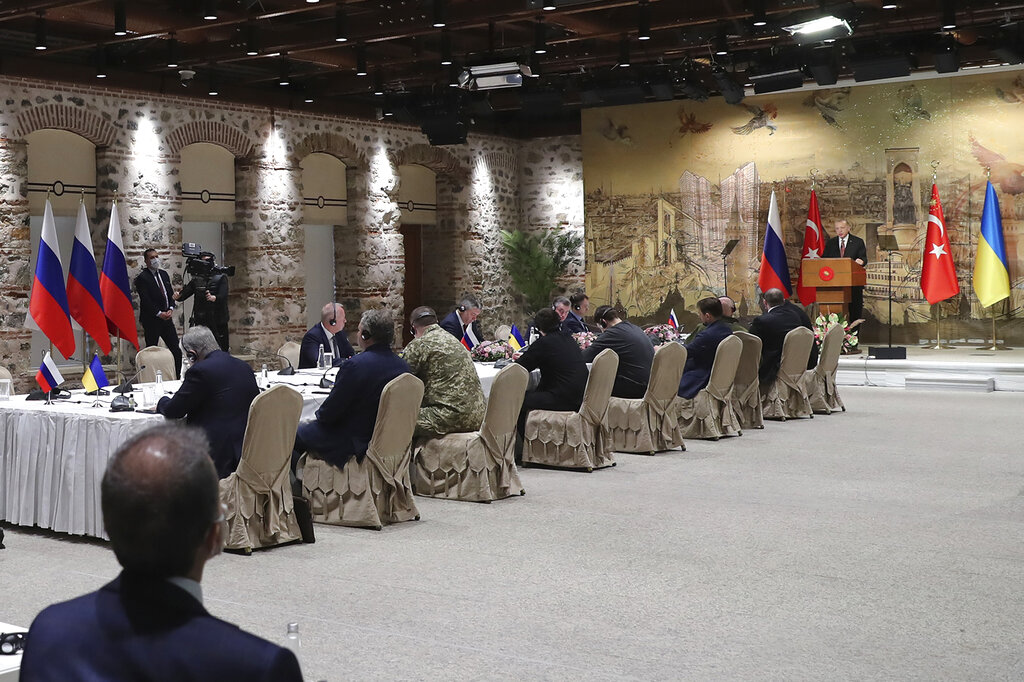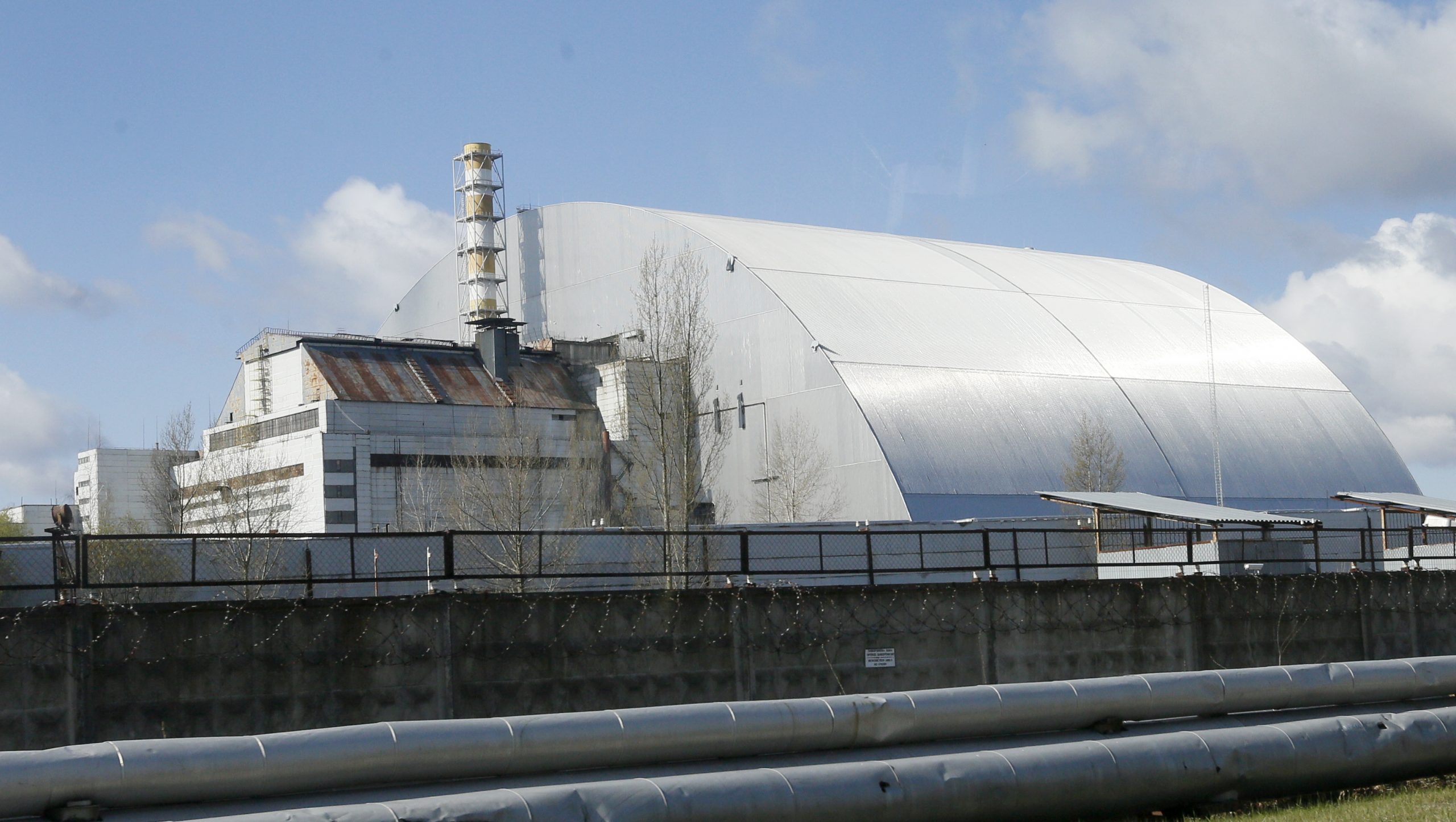Peace talks between Russia and Ukraine ended Tuesday in Turkey with some optimism that both sides may be one step closer to ending the war.
Russia pledged to “reduce military activity” significantly near Ukraine’s capital city of Kyiv, as well as in Chernihiv to the north. Moscow also said it was ready to set up a meeting between President Vladimir Putin and Ukrainian President Volodymyr Zelensky once a draft peace agreement is in place.
Ukrainian officials outlined potential concessions over territory occupied by Russia, including a proposal that negotiations over Crimea, which Russia annexed in 2014, be conducted over a 15-year period. Ukraine also said it would refrain from trying to retake the peninsula by force.
Zelensky said his country is prepared to declare its neutrality, as Russia demanded, and is also open to compromise over the fate of the contested Donbas region in the eastern part of Ukraine.
Negotiators from both sides met at the 19th century Dolmabahce Palace in Istanbul and discussed international security guarantees for Ukraine, as well as securing a ceasefire.

Russia’s claim that it would “fundamentally” scale back operations near Kyiv was met with skepticism from the United States and other leaders.
U.S. Secretary of State Antony Blinken said he had not seen anything indicating talks were progressing in a positive way and claimed Russia’s promise to scale back could be an attempt for Moscow to “deceive people and deflect attention.”
“There is what Russia says, and there is what Russia does, and we’re focused on the latter, and what Russia is doing is the continued brutalization of Ukraine,” he said in Morocco.
He added, “If they somehow believe that an effort to subjugate only the eastern part of Ukraine or the southern part of Ukraine … can succeed, then once again, they are profoundly fooling themselves.”
EUCOM HEAD CONTRADICTS BIDEN ON US TRAINING UKRAINIAN TROOPS IN POLAND
But Gen. Tod Wolters, commander for U.S. European Command, said reports that Russians are pulling away from Kyiv is “exactly what we see” during a Tuesday hearing in front of the Senate Armed Services Committee.
During the Ukraine-Russia meeting, which was hosted by Turkish President Recep Tayyip Erdogan and attended by Russian oligarch Roman Abramovich amid claims he may have been poisoned earlier this month, negotiators also discussed a possible ceasefire.
The conflict exploded after Putin ordered troops to invade Ukraine on Feb. 24, claiming it was rife with Nazis. He had boasted on national television that the conflict would be quick and contained — but nearly five weeks later, all there is to show are thousands of dead civilians and a haunting humanitarian crisis.
Erdogan told the delegations they had a “historic responsibility” to end the war and that “having a ceasefire and peace as soon as possible will be to the benefit of everyone.”
“We believe we are in a phase now to have concrete results from the talks,” he told negotiators sitting on opposite sides of a long table in front of him.
At the meeting, Abramovich was photographed speaking with Erdogan, as well as Turkish Foreign Minister Mevlut Cavusoglu, before the talks began.
Abramovich has shuttled between Kyiv and Moscow for weeks trying to broker a peace deal. On Monday, reports surfaced that he, along with at least two other Ukrainian negotiators, had been a victim of potential poisoning, though the details remain cloudy.
ABRAMOVICH AND UKRAINIAN PEACE NEGOTIATORS SUFFERED POISONING SYMPTOMS: REPORT
Kremlin spokesman Dmitry Peskov said Abramovich was not an official member of the Russian delegation but was in Turkey “from our side” and had been “involved in ensuring certain contacts between the Russian and Ukrainian sides.”
Reposting with better picture: Abramovich pictured in Turkey during the peace talks. Associates say he has lost weight… pic.twitter.com/XbQZrQt0we
— Max Colchester (@MaximColch) March 29, 2022
Even as negotiators met to discuss peace, the fighting in Ukraine continued, with Russian forces hitting an oil depot in western Ukraine and a government building in the south.
During his nightly address to the nation, Zelensky told his country that Ukraine’s people “still have to fight, we have to endure.”
“This is a ruthless war against our nation, against our people, against our children,” he said.
Zelensky, once again, took aim at Western countries for not doing enough to help Ukraine and said, as a result, Ukrainians are paying with their lives.
“If someone is afraid of Russia, if he or she is afraid to make the necessary decisions that are important to us, in particular for us to get planes, tanks, necessary artillery, shells, it makes these people responsible for the catastrophe created by Russian troops in our cities, too,” he said. “Fear always makes you an accomplice.”
Western nations have fast-tracked billions of dollars in humanitarian aid for Ukraine and sent an arsenal of weapons and ammunition to help in its fight against Russia. Zelensky, though, has asked for more, including for NATO to enforce a no-fly zone, which has been denied.
A Russian strike on a government building in the port city of Mykolaiv destroyed a large portion of the building and left around a dozen people trapped inside, the region’s governor said.
Separately, the head of the International Atomic Energy Agency arrived in Ukraine Tuesday amid safety concerns at the country’s nuclear facilities, which have been targeted by Russian forces.
“The military conflict is putting Ukraine’s nuclear power plants and other facilities with radioactive material in unprecedented danger,” IAEA Director General Rafael Grossi said. “We must take urgent action to make sure that they can continue to operate safely and securely and refuse the risk of a nuclear accident that could have a severe health and environmental impact both in Ukraine and beyond.”
CLICK HERE TO READ MORE FROM THE WASHINGTON EXAMINER
Within the first few days of the conflict, Russian forces captured the Chernobyl nuclear facility, the site of the world’s worst nuclear disaster and an area where nuclear waste is stored. Ukrainian officials have claimed that damage done to the site by Russian forces has exposed people to radiation.

